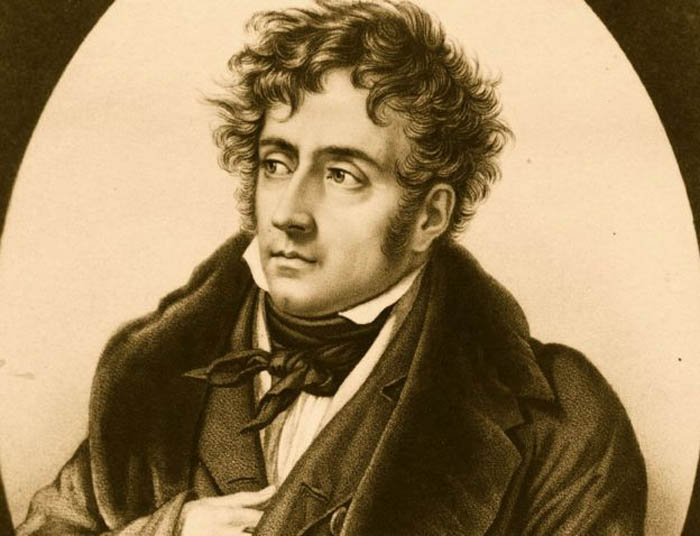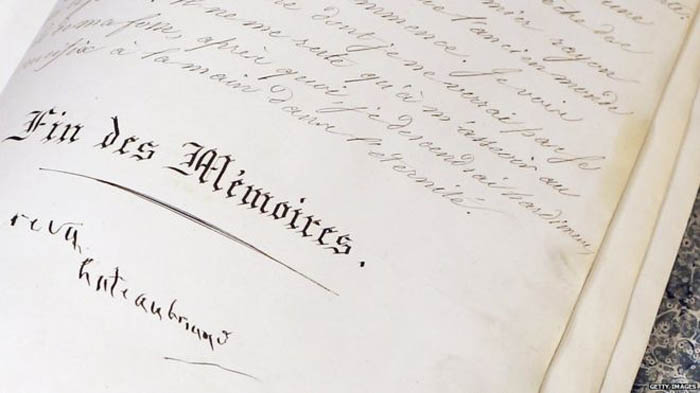Pascal Dufour, a lawyer whose family business goes back five generations, is being prosecuted for trying to sell the original manuscript of one of France`s best-known books, the Memoirs from Beyond the Tomb by Francois-Rene de Chateaubriand (1768-1848).
Mr Dufour says that the manuscript is in law "res delicta" - something abandoned - and so he has the right to dispose of it as he wills. It was his bid to sell the work in 2013 that first brought the law down on his head.
Opposing him is the prosecutor`s office, which accuses him of "aggravated breach of trust" towards Chateaubriand`s now very distant heirs.
The story begins in 1836 when the Vicomte de Chateaubriand - now aged 68 and long established as a Romantic literary lion - agreed with his publishers over the rights to his long-awaited Memoirs.

In return for an annual income, Chateaubriand said that on his death - but not before - the publishers could release the 42 volumes of recollections of his long life. Hence their name: Memoirs from Beyond the Tomb.
The book went on to become a Romantic classic, and extracts are studied by French lycee students to this day.
To seal the contract, a manuscript written by his secretary and signed with Chateaubriand`s own hand was deposited at the lawyer`s office in Paris. The safe had three locks and three keys: one each given to the viscount, the publisher and the lawyer.
That way, there was no danger of Chateaubriand`s wishes being broken.
In 1847, a year before his death, the three keys were united again, and a new and fuller version of the Memoirs replaced the original in the safe. This is the manuscript at the heart of today`s legal battle.
Francois-Rene de Chateaubriand
* Born Sept 1768 into aristocratic family
* Seen as among France`s first Romantic writers - as a child, Victor Hugo wrote: "I want to be Chateaubriand, or nothing"
* After French Revolution, travelled to the United States, then London. Brother killed by guillotine in 1794
* In 1802 publishes Genius of Christianity and in 1805 romantic novel Rene
* Key opponent to Napoleon; later peer of France and foreign minister
* Memoirs from Beyond the Tomb: started in 1809, appears after his death in 1848, covering his personal life and French history
Pascal Dufour is the great-great-great-grandson of Jean Dufour, who was a clerk in the office of Chateaubriand`s lawyer and eventually took it over. Every Dufour in the intervening generations has run the same Paris law firm.
Two years ago - after having the manuscript valued at between €400,000 (£290,000; $446,000) and €500,000 - he put it up for auction at the Paris sales house Drouot.
But the sale was stopped after the state prosecutor intervened.
For the prosecutor, time is immaterial. According to his argument, the lawyer`s office is - and will always be - a mere depository. The fact of holding a valuable artefact for generations does not give the lawyer proprietary rights.
On the contrary, says Mr Dufour`s lawyer Patrick Maisonneuve: "The manuscript was no longer `deposited` at the lawyer`s office. My client is the owner, because the manuscript had been abandoned."
Conundrum
State lawyers have tracked down the closest known heir to Chateaubriand, Guy de La Tour du Pin (scion of another noble family).
Chateaubriand had no children of his own, so Mr de La Tour du Pin is the descendant of the writer`s elder brother.
Guy de La Tour du Pin has not filed a suit against Pascal Dufour but he does want the manuscript restored to the family.
But complicating the matter is that there is a rival claimant as Chateaubriand`s heir - and that is Mr Dufour`s own wife Anne!
Anne Dufour`s mother was a La Tour du Pin - the sister of Guy`s grandfather. So the two rival claimants are first cousins once removed. They are no longer talking, according to Le Monde newspaper.
All in all it is a thorny legal conundrum that the 30th chamber of the Paris criminal court is being called upon to judge.
More about:
















































